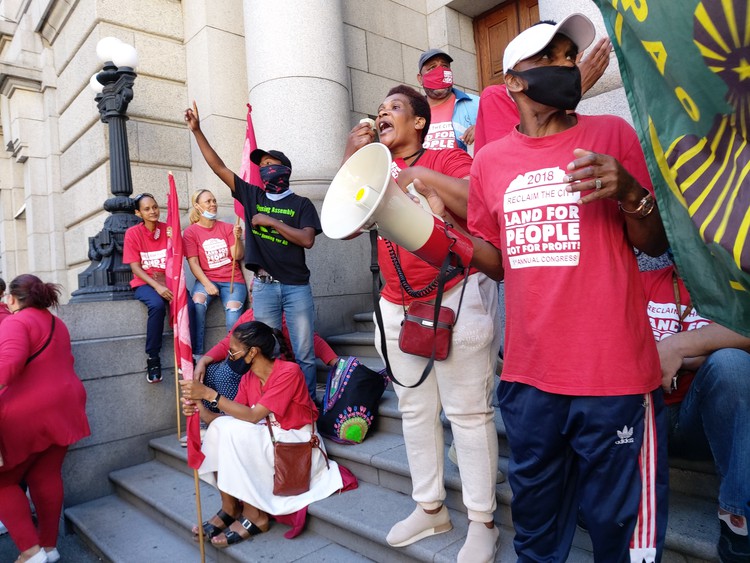Activists oppose bid to survey Woodstock Hospital occupiers
Case to be heard in High Court in April
About 50 members of Reclaim the City outside the Western Cape High Court on Friday. Photo: Liezl Human
- Reclaim the City is opposing the City of Cape Town’s application in the Western Cape High Court to do a survey of the people occupying Woodstock Hospital.
- The City says its survey is merely to determine whether the occupiers are employed, their eligibility for subsidised housing, and their willingness to vacate the hospital.
- But the housing movement believes it’s just a way for the City to institute eviction proceedings against the group.
- The case will return to court on 22 April.
The City of Cape Town’s bid to get a court-ordered survey of the occupiers living in the former Woodstock Hospital will be the first step in its plan to evict the group who have been living there since 2017. This is according to Reclaim the City who are opposing the City’s application in the Western Cape High Court to survey the nearly 900 occupiers who have renamed the hospital to Cissie Gool House.
On Friday 26 February, the matter was postponed. Reclaim the City, represented by the Centre for Applied Legal Studies, asked Acting Judge de Villiers for more time to respond to the City’s application. They agreed to postpone the hearing until 22 April.
Karen Hendricks, a Reclaim the City leader, said that occupiers have always been willing to talk to the City about possible housing solutions.
In a recent press release, the housing movement said the two weeks notice period they had to oppose the case was not enough time for the occupiers who are “poor and working class”.
Reclaim the City said the former hospital is home and a refuge to many people who have been displaced by the gentrification of the Woodstock and Salt River areas. GroundUp has previously reported on the challenges many occupiers have been facing since the start of the Covid-19 lockdown.
Mayco Member for Human Settlements Malusi Booi disputed the organisation’s claims, saying that the survey will merely be “a lawful process of engagement with the occupiers” and to get a better “indication of their needs.” This will include whether the occupiers are employed, their income, whether they are eligible for subsidised housing, as well as their willingness to vacate the hospital.
Booi said the City would provide housing to occupiers who qualify for assistance.
In a recent statement, the City said that the occupation has delayed its plans to build 700 social housing units on the hospital site.
“It is hoped that people will move from the property voluntarily. If need be, the City will pursue eviction proceedings subject to lockdown regulations and all due process will be followed,” the statement reads.
Support independent journalism
Donate using Payfast

Don't miss out on the latest news
We respect your privacy, and promise we won't spam you.
Next: A dying man makes the case for legalising euthanasia
Previous: Wolwerivier five years on: “We’re as desperate as the day we moved in”
Letters
Dear Editor
Housing Assembly is deeply saddened by the COCT’s intentions to evict CGH residents without meaningfully engaging, with no provision of alternative accommodation, in the midst of a global pandemic and without allowing any opposition in court. We are excited that the city has finally recognised the value of building social housing near the CBD where there are sufficient job opportunities, basic government amenities, public transport and a market for the various livelihood choices that poor and working-class people have. This is certainly a step in the right direction for spatial justice. However, the way that the city is going about this displays a complete lack of consideration for the residents of CGH as this eviction will effectively make the 900 residents homeless. We also acknowledge that the City has no intentions of building social housing as it has already issued a statement of privatising lands that are on their boundaries. This means they're intending to privatise this space. Why they don't start with Pine Road if they are serious about building social housing?
© 2021 GroundUp. This article is licensed under a Creative Commons Attribution-NoDerivatives 4.0 International License.
You may republish this article, so long as you credit the authors and GroundUp, and do not change the text. Please include a link back to the original article.
We put an invisible pixel in the article so that we can count traffic to republishers. All analytics tools are solely on our servers. We do not give our logs to any third party. Logs are deleted after two weeks. We do not use any IP address identifying information except to count regional traffic. We are solely interested in counting hits, not tracking users. If you republish, please do not delete the invisible pixel.

